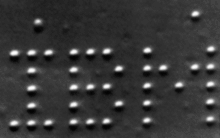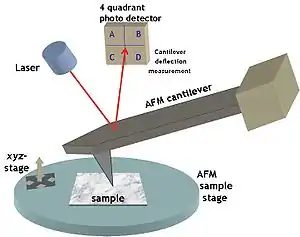IBM (atoms)
IBM in atoms was a demonstration by IBM scientists in 1989[1] of a technology capable of manipulating individual atoms. A scanning tunneling microscope was used to arrange 35 individual xenon atoms on a substrate of chilled crystal of nickel to spell out the three letter company initialism. It was the first time atoms had been precisely positioned on a flat surface.[2]

On April 30, 2013 IBM published an article on its website and a video on YouTube called "A Boy and His Atom: The World's Smallest Movie".[3]
Research
Donald Eigler and Erhard Schweizer of the IBM Almaden Research Center in San Jose, California, discovered the ability using a scanning tunneling microscope (STM) to move atoms about the surface.[4] In the demonstration, where the microscope was used in low temperature,[5] they positioned 35 individual xenon atoms on a substrate of chilled crystal of nickel to form the acronym "IBM". The logo they created measured three billionths of a meter long.[6] They also created chains of xenon atoms similar in form to molecules. It is noted that the demonstrated capacity showed the potential of fabricating rudimentary structures and allowed insights as to the extent of device miniaturization.[5]
See also
References
- "IBM's 35 atoms and the rise of nanotech". CNET News.
- "2 Researchers Spell 'I.B.M.,' Atom by Atom". The New York Times. 5 April 1990.
- "A Boy and His Atom: The World's Smallest Movie" - IBM; "A Boy and His Atom: The World's Smallest Movie" - YouTube
- Hey, Anthony J. G.; Hey, Tony; Walters, Patrick (2003). The New Quantum Universe. Cambridge, UK: Cambridge University Press. p. 82. ISBN 0521564182.
- Baird, Davis; Nordmann, Alfred; Schummer, Joachim (2004). Discovering the Nanoscale. Amsterdam: IOS Press. pp. 140. ISBN 1586034677.
- McCray, W. Patrick (2017). The Visioneers: How a Group of Elite Scientists Pursued Space Colonies, Nanotechnologies, and a Limitless Future. Princeton & Oxford: Princeton University Press. p. 230. ISBN 9780691176291.

